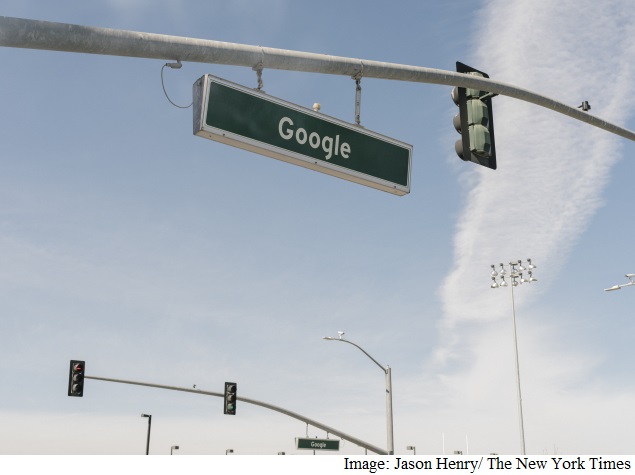- Home
- Internet
- Internet News
- With New Google Base, City Fears Being Overrun
With New Google Base, City Fears Being Overrun

This week, Google, the search giant, is expected to propose new headquarters - a series of canopylike buildings from Heatherwick Studio, a London design firm known for works like the fiery caldron at the 2012 Olympics, and Bjarke Ingels, a Danish architect known for his innovative designs.
The project in Mountain View, which Google has not made public but has discussed with members of the City Council, is likely to aggravate an increasingly testy relationship between the company and community leaders who fear the company is overrunning their small city.
When Google moved here in 1999, it had a dozen employees and a search engine known only to computer aficionados. Now, its 20,000 local employees make it the biggest employer in a city that is bursting at the seams.
"Our problem is that we have too many good jobs," said Leonard M. Siegel, a 66-year-old environmental activist who was recently elected to the City Council. "Everyone else wishes they were in our situation, but it's a crisis for the people here."
The same story is playing out across Silicon Valley. In Menlo Park, home of Facebook, the November election featured a measure - ultimately rejected by voters - that would have cut downtown office growth in half. Citizen groups in nearby Palo Alto have rebranded their City Council's most anti-development members as "residentialists."
"Nobody wants change," said Gilbert Wong, a councilman in Cupertino, Apple's hometown. "It's my role as an elected official to explain to our residents that either you get on board and help us figure out the balance between jobs and housing, or other people are going to make that decision for us."
Google owns or leases about 7.3 million square feet of office space in Mountain View - roughly equivalent to three Empire State Buildings. That includes most of the property around its headquarters on the north side of the city near Highway 101, which cuts the length of the valley, according to Transwestern, a commercial real estate brokerage.
That success has brought Mountain View loads of tax dollars and a 3.3 percent unemployment rate, as well as skyrocketing home prices and intolerable gridlock. Good and bad, tech is responsible for most of it: Technology companies account for 27 percent of the jobs in the Silicon Valley region, compared with 7 percent in California and about 5 percent nationally, according to Moody's Analytics.
The result is an existential argument that pits residents who want to halt the city's growth against people who think Mountain View needs to grow up and become a real city.
Mountain View, about 40 miles south of San Francisco, has close to 80,000 people; with its strip-mall thoroughfares and streets of single-family homes, it looks like a sleepy suburb. But since hiring has boomed, the city's roads swell with commuters during the morning and evening rush.
Katherine Suri, a retired Nasa scientist, moved to the city in 1974 and lives on a quarter-acre lot whose original views included a nursery and apricot orchards. She spent a good deal of the '80s chauffeuring her children around town in an Oldsmobile station wagon.
Now her view is of other houses, and the traffic is so bad that Suri makes sure to schedule her doctors' appointments around 11 a.m. When she walks to the YMCA each morning, she sometimes has to weave between cars stuck in gridlock.
Despite the inconveniences, Suri has accepted that the city will change whether she likes it or not. "Mountain View is getting more populous with Google and the other companies, and that's just the way it is," she said. "We need to learn how to deal with it."
Google has tried to reduce traffic, for both the city and itself. It transports its employees to work in private buses and was at one point experimenting with bringing some of its San Francisco workers in on boats. In January, the company started a free daytime shuttle that is open to the public, and during the daytime its workers can be seen pedaling around the city on multicolored company bikes.
Since so much of the traffic is associated with Google, Mountain View has spent the last two years debating a plan to redevelop the city's North Bayshore area, which surrounds Google's main offices and is close to major highways.
Google's vision for a new Googleplex, the nickname for the company's headquarters, will include bike and pedestrian paths and is one of several development proposals from various companies expected to be submitted to the city Friday.
"These companies are world-class corporations bringing worldwide attention to Mountain View, and Mountain View needs to evolve to a world-class city," said Ken S. Rosenberg, one of seven members of the City Council. "One of the criteria of a world-class city is that it is architecturally interesting."
Even if Google's proposal is accepted, the city's most divisive issue - how much new housing to build and where - has yet to be settled. Google executives have said on several occasions that they want to add housing to North Bayshore, but Mountain View's outgoing City Council found many reasons to say no.
One argument was that it would be dangerous to burrowing owls that live underground in adjacent Shoreline Park. Another was that if people moved there, they would soon want more schools and other expensive services. Others feared that new housing could create a Google voting bloc.
Last November, in an election that was widely viewed as a referendum on the city's housing policies, Mountain View elected three candidates, including Rosenberg, who campaigned on the idea of adding housing near Google's campus, an idea that runs contrary to the previous council's redevelopment plan.
Google's headquarters proposal does not include any plans for housing. But the company has told the City Council that it wants housing, and lots of it. Councilman Siegel, for one, agrees. He wants to amend the city's plan to allow at least 5,000 new housing units.
That this could bring in even more Google employees is just what some people fear.
"This last election we had maybe 12,000 voters," said Jac Siegel, a city councilman who left office this year and is not related to Leonard Siegel. "If you brought 5,000 people in and they all work for Google and they said, 'We want you to vote for this candidate,' they can own the town."
© 2015 New York Times News Service
Get your daily dose of tech news, reviews, and insights, in under 80 characters on Gadgets 360 Turbo. Connect with fellow tech lovers on our Forum. Follow us on X, Facebook, WhatsApp, Threads and Google News for instant updates. Catch all the action on our YouTube channel.
Related Stories
- Samsung Galaxy Unpacked 2026
- iPhone 17 Pro Max
- ChatGPT
- iOS 26
- Laptop Under 50000
- Smartwatch Under 10000
- Apple Vision Pro
- Oneplus 12
- OnePlus Nord CE 3 Lite 5G
- iPhone 13
- Xiaomi 14 Pro
- Oppo Find N3
- Tecno Spark Go (2023)
- Realme V30
- Best Phones Under 25000
- Samsung Galaxy S24 Series
- Cryptocurrency
- iQoo 12
- Samsung Galaxy S24 Ultra
- Giottus
- Samsung Galaxy Z Flip 5
- Apple 'Scary Fast'
- Housefull 5
- GoPro Hero 12 Black Review
- Invincible Season 2
- JioGlass
- HD Ready TV
- Latest Mobile Phones
- Compare Phones
- Vivo V70
- Vivo V70 Elite
- Google Pixel 10a
- Tecno Camon 50
- Tecno Camon 50 Pro
- Lava Bold N2
- Vivo V60 Lite 4G
- Tecno Pova Curve 2 5G
- Asus Vivobook 16 (M1605NAQ)
- Asus Vivobook 15 (2026)
- Infinix Xpad 30E
- Brave Ark 2-in-1
- boAt Chrome Iris
- HMD Watch P1
- Xiaomi QLED TV X Pro 75
- Haier H5E Series
- Asus ROG Ally
- Nintendo Switch Lite
- Haier 1.6 Ton 5 Star Inverter Split AC (HSU19G-MZAID5BN-INV)
- Haier 1.6 Ton 5 Star Inverter Split AC (HSU19G-MZAIM5BN-INV)





![[Partner Content] OPPO Reno15 Series: AI Portrait Camera, Popout and First Compact Reno](https://www.gadgets360.com/static/mobile/images/spacer.png)









